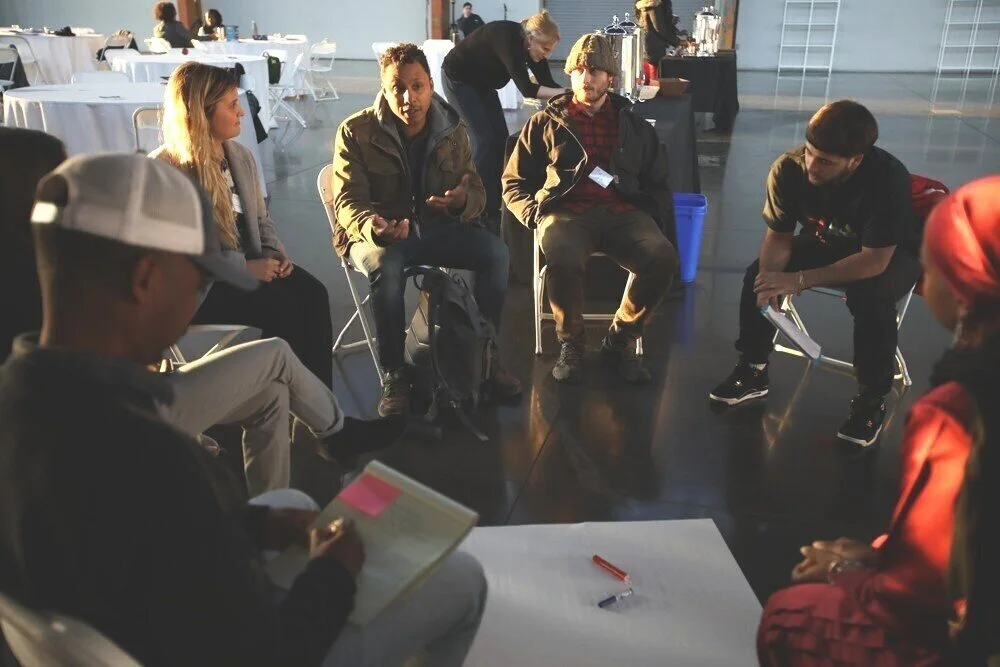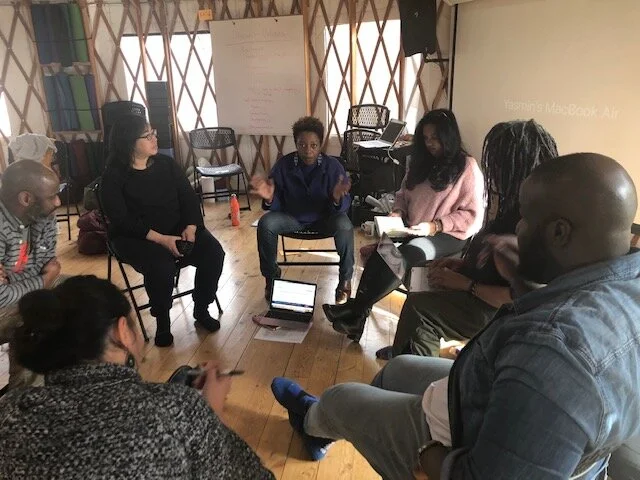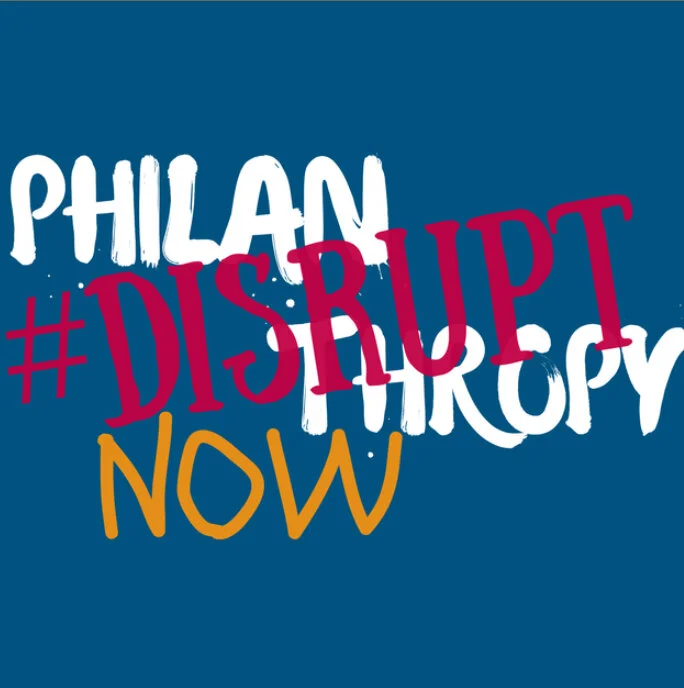“So, it begs the question around the way in which we think about how philanthropy gets done in a charitable sense in this country, and that it doesn't foster the kind of solidarity and self-determination of communities, to alleviate all of the issues that people are spending their time writing applications for. And so with that I think the [#DisruptPhilanthropyNOW!] blog tries to create an opportunity to have grantees and also have program staff interrogate the ways that philanthropy is being practiced, and then create spaces for accountability in real time.”
Read MoreWe cannot significantly move the needle for racial justice if we are unwilling to challenge how resources are distributed. If we are hesitant in working to create accountable practices with foundations. If our interactions with the organizations who fund us are not aligning with our vision and values of racial justice and liberation. If we are not organizing for transformational change in the philanthropic sector. We urge advocates, organizers, and practitioners to challenge philanthropy, so we can collectively tackle how structural racism and white supremacy is operating. Let’s do some truth-telling - share your story!
Read MoreWhite trustees and consultants name foundation practices that reinforce, rather than disrupt, the white supremacy, anti-Blackness, and structural inequality upon which foundation wealth has been built and is maintained. We use this blog to focus our collective attention on proposed remedies where power is exercised.
Read MoreMany mutual aid groups are popping up as unincorporated efforts with little formal structure and no established fiscal sponsor relationship. Platforms like Venmo offer opportunities for these ad hoc groups to bring in community donations, but access to institutional philanthropic resources is immediately limited given requirements around tax status or a track record for an applicant. Institutional philanthropy is historically - and intentionally - structured to create a power imbalance through which a privileged few determine the allocation of resources…
Read MoreSince the outbreak of COVID-19, there have been several articles/blogs written about philanthropy’s response and what philanthropy’s response should be. Some thought pieces focus on the need for the sector to center racial equity and systemic change, many provide a call to action, and a few offer innovative ideas for this time. [2]
Read MoreIf key stakeholders are: 1) not clear in their analysis about the rights and conditions of NFL players, 2) look at how that connects the NFL’s ability to authentically lead a social justice initiative, and lastly 3) lead an initiative that shifts decision making power of how resources are being used to address these issues, then the NFL Foundation’s 90M pledge to Inspire Change and its efforts with Roc Nation are nothing more than smoke and mirrors. Perhaps we can use this moment to call a movement mic check rather than a fact check to learn lessons from Jay-Z’s philanthropic partnership with the NFL in order to assess how this initiative is contributing to the issues it says it wants to address moving forward.
Read MoreIn November 2018, 25 activists, organizers, fundraisers, donors, and other supporters of movements for racial, gender and economic justice gathered at the Watershed Center in Millerton, NY at the 3rd annual Old Money New System (OMNS) community of practice retreat.
Read MoreFirst, in order to achieve a truly participatory process, a foundation must be prepared to cede real power to the participatory panel in the design and implementation of the grantmaking process. Some foundations create a restrictive "container" around which the actual decision making becomes limited in breadth and scope—it’s an advisory conversation, or specifically-sought input around a certain question or proposal, and not grantmaking with breadth of authority.
Read MoreThe program officer told the provider to submit an application for a larger grant, one perhaps one-and-a-half to twice as large as before. The grantee was told to submit the paperwork. The program officer would handle the rest. Do not worry, the money would be there, they were told.
But that didn’t happen.
Read MoreWithin Our Lifetime Leadership Council decided to share our story and requests (listed below) publicly. We do so not to humiliate, or wag our finger, or to even assume that now they will respond to us. We do so because we are saying loud and clear – enough!
Read MoreThe #DisruptPhilanthropyNow! Campaign urges the W. K. Kellogg Foundation to reflect on its grant-making practices and make the necessary changes to address the harm done to CDI and the Battle Creek community and prevent it from occurring again.
Read MoreCommunity foundations, the very foundations that should be directly accountable to local communities, are engaging in practices that fundamentally go against their values. They are not funding grassroots organizing while avoiding discussions about structural racism and dominant preferences in philanthropy, and decreasing the power of unions
Read MoreUltimately, I didn’t mind not getting the contract because it would not have been profitable for my business but the experience caused me to question the extent to which this foundation in particular and foundations in general realize the ways their internal practices perpetuate the same inequalities they seek to remedy through their grantmaking. This same foundation has a growing investment in minority entrepreneurship yet they have no internal strategy that I’m aware of for building the minority-owned small businesses that currently support their grantmaking.
Read MoreThis is an accountability intervention and its purpose is to disrupt how we typically relate to each other and speak truth. We hope to collectively transform these relationships as well as the resource distribution system. This is also a wide-loving invitation to our colleagues, friends, and comrades in the racial justice movement saying: enough, let’s share our stories, let’s organize together in the philanthropic sector to demand a just distribution of resources, and commit to racial justice that is reflective in all funder practices.
Read MoreOur story is being told, not just the story happening between grantees and foundations, but as one of the many stories with devastating impacts for numerous organizations, especially people of color-led organizations, and communities of color. Though our story describes exasperating funding practices, more than inherent racially inequitable practices, as a people of color-led network, we experience differing impacts. Following this blog, other organizations and individuals will share their stories of inequitable practices, some sharing the funders’ name, others not. If you are interested in sharing your story, scroll to the end of the blog for more information.
Read MoreIn Part One of the #DisruptPhilanthropyNOW blog series, Within Our Lifetime and Old Money New System Community of Practice issued an invitation for courageous and collective action, joined by the National Committee for Responsive Philanthropy to movement building groups and racial justice and healing organizations. We urge groups to challenge philanthropy to develop racially just grant-making practices and transform structures, so we can collectively tackle structural racism and white supremacy.
Read MoreA graduate student interviewing me for a paper recently asked “How could we force foundations to transform their internal culture and open wider conversations about equity to as many stakeholders as possible?” I told her we can’t force foundations to do anything, unless or until the entire nonprofit sector calls a general strike.
If all 501c3 organizations refused to take money from institutions whose only obligation is to pay out 5 percent of assets per year toward charitable causes, presumably they would be compelled to come to the bargaining table.
Read MoreSeventy-six years ago, United States President Franklin Delano Roosevelt signed Executive Order 9066, a piece of legislation, among many historically, that criminalized an ethnic minority. As a result, my entire paternal family was incarcerated without due process. My father was born behind barbed wire on U.S. soil. In so many ways, this history has shaped my future.
Read More



















